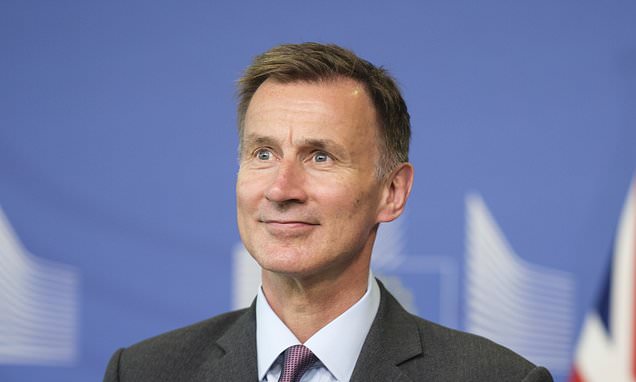
Some of Britain’s biggest providers of workplace pensions have pledged to pump more money into home-grown companies in a bid to boost growth.
Aviva and Legal & General are understood to be among pension firms who have offered to invest up to 5 per cent of their assets in so-called ‘unlisted equities’ – such as start-ups and private equity – by the end of this decade.
The agreement forms part of a package of reforms aimed at kickstarting retirement funds’ investment in the economy to be unveiled tomorrow in Chancellor Jeremy Hunt’s keynote Mansion House speech in the City. The speech – which is held annually – will be the Government’s final set-piece policy announcement before the autumn party conference season.
Hunt will tell an audience of business leaders he wants to enable the financial services sector ‘to increase returns for pensioners, improve outcomes for investors and unlock capital for our growth businesses’.
He is also expected to say: ‘Everything we do we will seek to secure the best possible outcomes for pension savers, with any changes to investment structures putting their needs first and foremost.’
Hunt wants to channel more of the estimated £3 trillion of pensions savings into start-ups, fintechs and other risky assets such as infrastructure and private equity in order to boost returns, especially for younger pension savers.
The Chancellor is also keen to encourage innovative firms to grow and stay in the UK.
The firms signing up to the pledge represent more than half the £700 billion defined contribution (DC) market. Unlike ‘gold-plated’ final salary schemes, DC pensions do not guarantee future retirement payouts and place all the investment risk on the individual rather than the employer.
Related Articles
HOW THIS IS MONEY CAN HELP
They have largely replaced final salary pensions, which became unaffordable for most firms.
It follows the recent decision by tech companies such as chip designer Arm to list their shares in New York rather than London. There has also been a dramatic drop in the amount of UK equities held by domestic pension funds over the last two decades, which Hunt is keen to stem. But the Chancellor has stopped short of ordering funds to invest set sums in specific sectors after managers and trustees argued it would clash with their obligations to pension savers.
He is pressing ahead with his proposals despite recent problems at Thames Water where investors such as the £90 billion Universities Superannuation Scheme face being wiped out if the debt-laden firm is taken back into public ownership.
DC pensions have been boosted by the success of auto-enrolment, which has seen more than 10 million workers enrol in retirement schemes for the first time.
But the amounts saved are relatively small because contributions are much lower than under final salary schemes.
The Government wants to boost pension pots, especially for younger savers, by encouraging investment in assets that offer higher returns over the long-term.
However, critics say that comes with the higher risk of savers losing money as most start-ups, for example, fail. They also argue there is little evidence that growth companies of the future lack access to capital today.
The Chancellor will also launch a consultation to compel the Local Government Pension Scheme, which has more than 6 million members, to go further in pooling the £360 billion of assets that belong to 86 local authorities.
Some links in this article may be affiliate links. If you click on them we may earn a small commission. That helps us fund This Is Money, and keep it free to use. We do not write articles to promote products. We do not allow any commercial relationship to affect our editorial independence.






